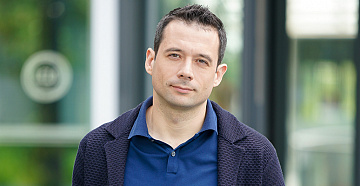More than a system integrator
Ability to promptly adopt the most recent technologies and take a look five years into the future, a combination of start-up spirit and soundness of an experienced player—these are the qualities that a modern system integrator needs. What new skills the system integrator needs to master, how these novelties affect their business, how they are embodied in the implemented projects and new developments—Roman Ostapchuk, Deputy CEO for Technological Advancement in STEP LOGIC, told about all this during the virtual round table.
ICT-Online.ru: How do you think, what new competences does a modern system integrator (service integrator, digital provider, RPA, Data Science, Machine Learning, etc.) need to acquire and why? What market and technology trends led to this?
Integrators constantly tried to adjust to changing market. Let's think, among other things, that recently a fashion for direct outsourcing of vendors was widely spread among communications providers managed by local integrators that were a part of vertical holdings. On the other hand, integrators always strived to expand competences centralised development of which was the most practicable from the point of view of both the ability to accumulate expertise and its effective monetisation.
Therefore, none of the existent market conditions or changes in technology can't really provide any impact. A decision on what should be developed and what should be left out in the cold, is taken based on integrator's strategy, preconditions, corporate management specifics, customer base, marketing analytics, and many other parameters. Besides, this is not a one-time decision. This is a "spiral" process where decisions are taken at each whorl. However, no alternatives can yet be found to this trend.
We, as the major versatile and multi-vendor integrator, are going to create competence centres that will deal with service functions, RPA, Data Science, Machine Learning, quantum cryptography, and many other promising trends. A competence centre, in its turn, is going to address the challenge of in-house development of unique products and services.
ICT-Online.ru: What traditional functions of system integrators are now fading into insignificance or getting cancelled at all? Where does it all go? Would you express any appreciation of such changes?
First of all, we're not really talking about cancelling any of system integrator's functions, but rather about centralising them shaping independent business lines across the industry. This still relates to shell and core, in the first place. Besides, software development outsourcing centres are being intensely developed at the moment, and system integrators have every reason to start actively using the services provided by these companies. The same is true for outstaffing services to engage individual experts as part of civil law relations, which also requires creating a dedicated legal entity that will operate based on its own principles.
ICT-Online.ru: What impact does it have on the business of domestic integrators?
These changes will certainly provide meaningful impact on integrators' business. Those of them who develop and adapt consistently employing various strategic and tactic tools will achieve success. And those who act intuitively will surely face some challenges on their way. However, the profile of the integrator does not really matter. This may be an integrator possessing classic expertises that are widely available in the market, but if these expertises are appropriately developed and effectively marketed, the integrator will be a success anyway.
It's worth noting that ambivalent requirements currently provide quite a significant impact on business activities: being innovative, invest in development of advanced expertises, and still be a solid and solvent company, a reliable partner to your customers. Such a combination of adventurous spirit and "start-up mind" with soundness and guaranteed highest quality of products and services requires an integrator to be flexible in its organisational structure and decision-making approach. And domestic integrators just can't help taking it into account.
STEP LOGIC is making energetic efforts in the field of transformation. We combine provision of a classic set of high-quality IT services at a competitive price with development of competence centres for advanced technologies, and prototyping.
ICT-Online.ru: Could you please give a couple of examples from the experience of your company?
At the moment, STEP LOGIC is developing a variety of business lines. However, I would like to tell about Industrial IoT (IIoT) competence centre in more detail. The centre strives to address the challenge of IIoT solutions replicability. That is, it accumulates knowledge based on pilot and live projects, enunciates major components of the value of specific solutions for the customers, and assesses economic efficiency of product offers. This work is aimed at helping our customers to identify best practices and technologies and positing criteria of their successful adoption.
Despite the IIoT competence centre was created just a short time ago, it can already boast a number of successful business cases. This, we have developed an end-to-end system based on this competence centre to prevent loss for a federal bank's branch office. The system is based on an integral approach that covers the entire scope of actionable data: video analytics, ACS parameters, and data from payment processing systems. Besides, based on the previously designed 3D model (BIM) for a major retailer's construction project, we have developed a prototype digital model and updated operation process with regard to its application. This practical implementation of a "digital twin" is intended to accelerate operation processes and improve the quality of work performance (reduce the share of extra and emergency responses).
ICT-Online.ru: How do you assess the prospects of this trend for the market and for your company?
The existing market trend looks quite steady and long-run. All changes that will happen in the companies in the context of adapting to these new conditions will bear fruits in the mid-run or maybe in the long-run. Our plan is to actively transform our business and improve our customer relations.
Source: ICT-Online.ru
